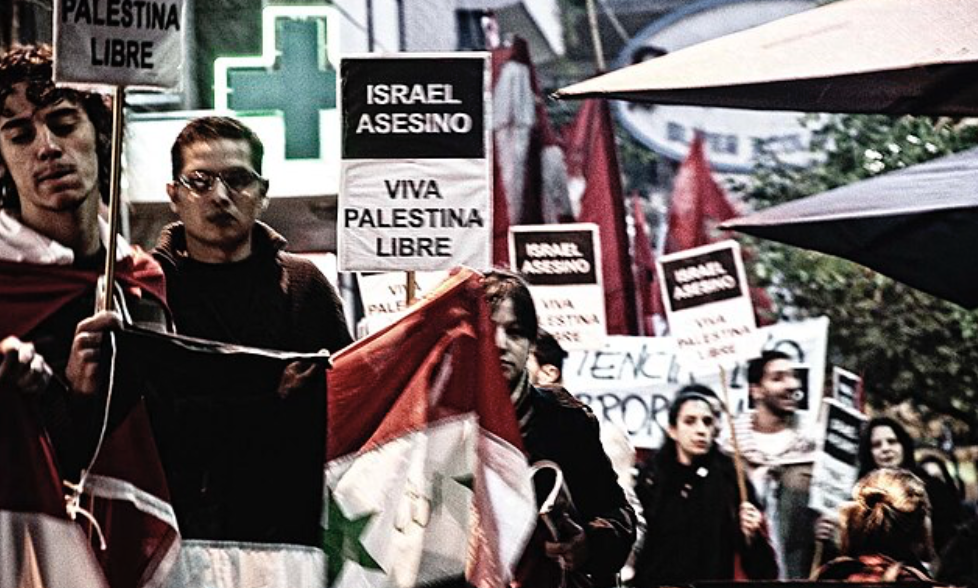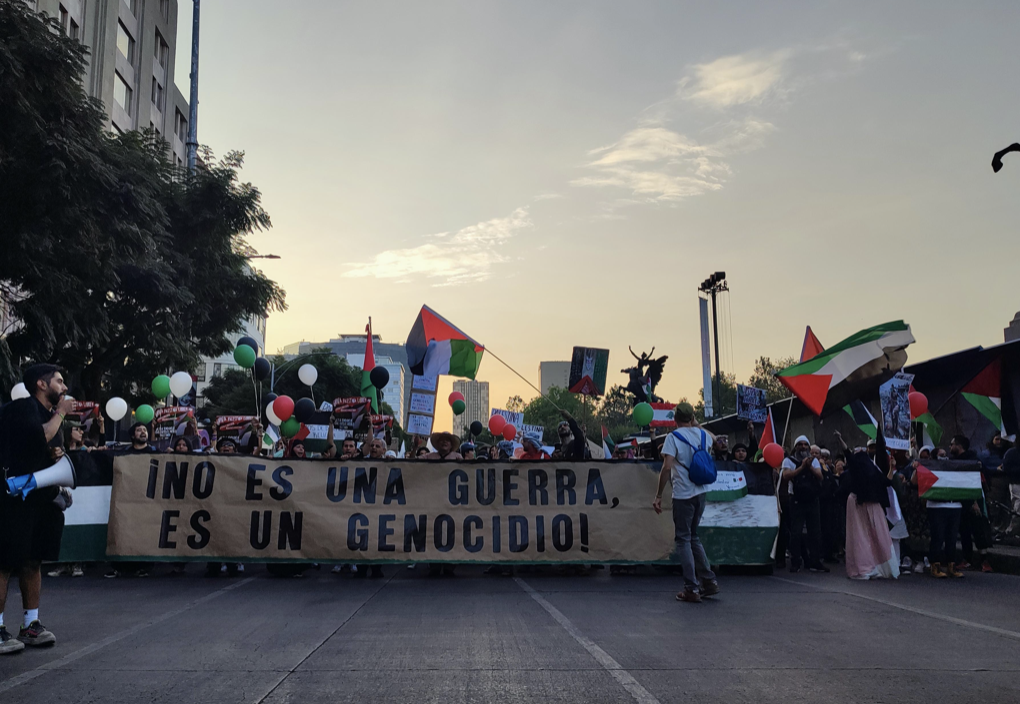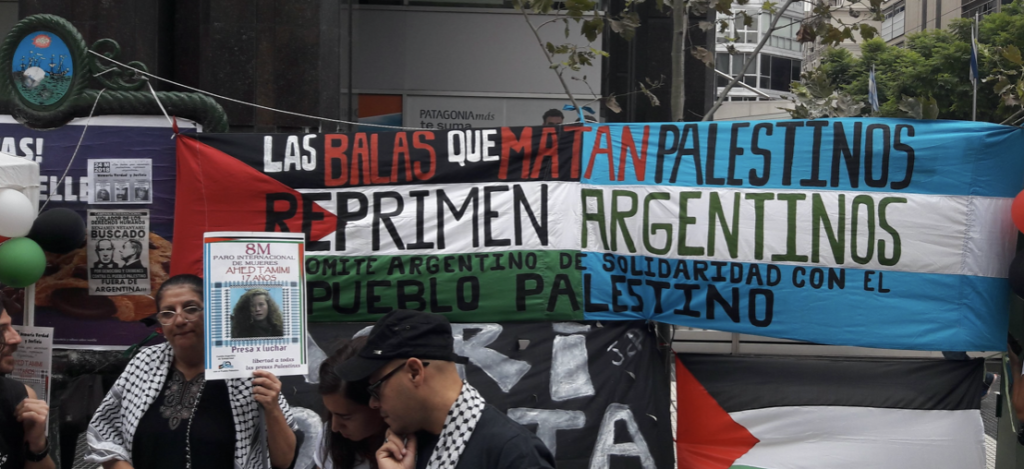Why Latin America Advocates for Palestine: Roots of Solidarity and Resistance

By: Nissrine Bedda / Arab America Contributing Writer
While many Western countries align with the policies of Israeli Prime Minister Benjamin Netanyahu, often appearing to act in support of Zionist agendas, the nations of Latin America show strong solidarity with the Palestinian people. This connection goes beyond political alliances and reflects a shared history and cultural understanding.
From Palestinian identity and traditions to the preservation of their roots and, most importantly, their land, Latin American empathy for Palestinians is deeply rooted in the region’s history of Arab migration, the celebration of heritage, and a profound understanding of the struggles faced by indigenous communities. These nations recognize the pain of displacement and the fight to preserve one’s homeland and cultural identity against forces that seek to undermine or erase them.
From Mexico to Argentina, our Latino brothers and sisters, alongside their parliaments, have taken meaningful steps to raise awareness about the genocide endured by Gazans over the past year. They have also pursued higher-level diplomatic efforts to work toward a lasting resolution. Some may see this as solidarity born from shared struggles, but we call it empowerment.
Colombia
Colombia has long endured a history of right-wing governments, whose policies have often left the nation grappling with profound challenges, including the narcotics crisis and issues of state illegitimacy. However, the election of Gustavo Petro, Colombia’s first-ever left-wing president, marks a significant shift in the country’s political landscape. Petro’s administration has not only broken with traditional norms—such as Colombia’s historical alignment with the United States on foreign policy—but has also taken bold stances on international issues, including labeling the Israeli Parliament’s actions as genocidal. This departure from convention reflects a broader transformation in Colombia’s political direction under Petro’s leadership.
At the early beginning of the Genocide against Palestinians, Colombia was amongst the small group of nations to push for a UN Security Council Resolution for the much needed aid that Gaza was lacking at the time with the borders being closed. Petro took to X to mention, “The head of the state who carries out this genocide is a criminal against humanity”. To add to his solidarity with the Palestinian people and their homeland, Colombia, Chile, and Honduras have all recalled their ambassadors from Tel Aviv.
Mexico

With new president Claudia Sheinbaum, Mexico’s First Female President, joining office earlier this year, Mexican’s were shocked to see the advocacy of the president of Jewish descent for the palestinian people. In recent weeks, with the ICC issuing of an arrest warrant on Benjamin Netanyahu, former Defense Minister Yoav Gallant, and a senior Hamas official for war crimes since October 7th, we can find Mexico amongst the list of other Latin American nations to be obliged to enforce the arrest warrants.
Mexicans, alongside their government, have taken to the streets to protest the violence in Gaza, raising awareness about Palestinian identity and the importance of preserving native lands. Given Mexico’s rich indigenous heritage and deep connection to its Aztec lineage, it is unsurprising that many Mexicans stand in solidarity with Palestine. This support persists even in a nation known for its strong Jewish community.
“Argentina y Palestina”
Argentina was known during the Second World War to take in a huge population of Jews fleeing from Europe into South America with their open-door immigration policy. Now, we can see the descendants of more than 200,000 Jewish holocaust survivors in the rioplatense nation. The current government (led by right-wing President Javier Milei) is totally aligned with Israel. While in some nations we would assume that this would inflict a zionist culture in the Latin American country, we must learn to understand the sociological/ historical elements that come into play for Latin Americans when it comes to indigeneity to which the conservation of sacred lands is protected, as well as remembered throughout history as how the underdog defeated its imperial power.

We can find Argentinian-Jews tell their stories on how the Israeli administration is committing these war crimes and how the jewish community as a whole should “do better” during these times coming from a history of bloodshed and antisemitism. In fact, The group — formed by more than 50 activists, mostly from Buenos Aires — has been enthusiastically welcomed by other pro-Palestine movements, most of them composed of people of Arab descent and left-wingers.
A video recently went viral of the renowned Argentinian-Jewish Actor, Norman Briski, accepting an award at the Martin Fierro Awards Ceremony. He dedicated his entire speech on the bloodshed in Gaza mentioning, ‘Gaza, Jamas sera vencido!’ translating to “Gaza will never be defeated”. As he wrapped up his speech he made sure to include the crowd that did not applaud with a play on words, “are buried in silence”
Chile
Chile has been known for its major Palestinian population with about more than an estimated 500,000 Chilean-Palestinians. Along with their professional soccer club named “Club Deportivo Palestina” which resides in the heart of Santiago, Chile, after a long history of neoliberal powers getting into the guts of the State for the past years, the Pink Tide which includes the recent influx of left-wing parliaments, including indigenous activists, who have been put into office since the Pandemic. This influx has brought significant changes to these nations, which were grappling with challenges such as inflation, diplomatic vulnerabilities, tariffs, and severe socioeconomic issues like widespread poverty.
The Chilean people, known for their resilience and rich literary tradition, express their poetic voices in a way that lingers in the mind, delivering a powerful message—particularly regarding their solidarity with the Palestinian people, shaped by a shared history of coexistence.
In fact, President Gabriel Boric released a statement saying “Gaza is in a much worse condition than Berlin was in 1945,” referencing the Fall of Berlin post-World War II. With the political stance taking shape, Chilean Pro-Palestinian demonstrations have filled the streets of Santiago, the nation’s capital, honoring the lives of Gazans lost since October 7th and inspiring members of Latin American nations to stand in solidarity with the Palestinian people and advocate for a Free Palestine!
Check out our blog!








